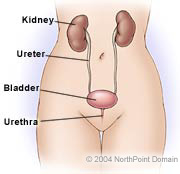Kidney infections, also known as pyelonephritis or upper urinary tract infections, occur when bacteria move up the ureters (the tubes that drain urine from the kidneys) and into the kidneys.
WHAT ARE THE SYMPTOMS?
The symptoms of a lower urinary tract or bladder infection include:
-
- Burning or painful urination;
- Frequent or urgent urination;
- Passing small amounts of urine;
- Frequent nighttime urination;
- Low back pain;
- Pain above the pelvic bone;
- Strong-smelling urine; and
- Cloudy urine.
When fever, chills, pain in the back or side below the ribs, nausea, or vomiting accompany these symptoms, it is a sign that an infection has moved to the kidneys.
CAUSES AND RISK FACTORS
The most common causes of kidney infection are:
-
- Infections with bacteria known to ascend the urinary tract to the kidney;
- Insertion of instruments into the urinary tract;
- Surgery of the urinary tract; and
- Obstructions of the urinary tract that prevent the flow of urine.
Risk factors include:
-
- Female gender;
- Sexual activity (women);
- Pregnancy;
- Older age (men and women);
- Insertion of a medical device;
- Diabetes mellitus;
- Nerve problems affecting the bladder;
- Kidney stones;
- Bladder tumor; and
- Vesicoureteral reflux.
DIAGNOSIS
Physicians can diagnose kidney infection after performing a careful medical history and physical examination. A physician may recommend one or more of the following tests:
-
- Urinalysis;
- Blood test; or
- Urine culture.
TREATMENT APPROACH
If a urinalysis reveals a kidney infection, and a person is not experiencing nausea and vomiting, dehydration, or infection of the bloodstream, the patient is prescribed a two-week course of antibiotics. Typically, the drug prescribed is trimethoprim-sulfamethoxazole (trade names Bactrim, Septra, or Cotrim) or a drug from the class of antibiotics called fluoroquinolones. These include ciprofloxacin (Cipro), levaquin, norfloxacin (Noroxin), and trovafloxin (Trovan).
People with severe kidney infections should be hospitalized and treated with antibiotics intravenously until symptoms begin to subside and they can take medication by mouth.
 Basic Facts
Basic Facts